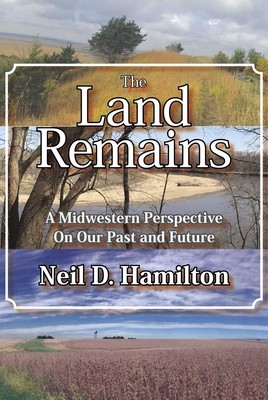
- We will send in 10–14 business days.
- Author: Neil D Hamilton
- Publisher: Ice Cube Press
- Year: 2022
- Pages: 344
- ISBN-10: 1948509334
- ISBN-13: 9781948509336
- Format: 15 x 22.6 x 2.3 cm, minkšti viršeliai
- Language: English
- SAVE -10% with code: EXTRA
Reviews
Description
Humankind enjoyed stunning population growth in the 20th and early 21st centuries, largely sustained by pioneering agricultural techniques that fed billions of people around the world. However, as Neil D. Hamilton writes in The Land Remains, a monomaniacal focus on agricultural production growth has obscured proper reverence for the conditions that make growing things possible at all.
Hamilton (The Legal Guide for Direct Farm Marketing) is an agricultural lawyer, conservationist and family farmer. He combines impressive conceptual and firsthand expertise with formidable research and testimonies to argue that the United States must transform its approach to farming and land stewardship if it is to continue to reap the great bounty of its fertile land. Though haunting images in stories like John Steinbeck's The Grapes of Wrath once imposed a proper respect for the land's weaknesses, the cultural memory of them--and the visionary leaders such traumas gave rise to--have faded. Today, far too much U.S. agricultural practice ignores techniques that are necessary to ensure that the land, and those who depend on it, can survive.
Hamilton writes with serious purpose but also a joyful heart. He is deeply familiar with farming, farmers and the vast constellation of corporations, interest groups and institutions that seek to feed the world but also, in many cases, maximize their profits. While fair-minded and compassionate, his writing is unsullied with false equivocation or feeble bromides about the supposed costs of doing business. The Land Remains is sobering and, at times, frightening, but it offers the inspiration of hopeful wisdom. --Walker Minot, teacher, freelance writer and reviewer
EXTRA 10 % discount with code: EXTRA
The promotion ends in 22d.07:18:13
The discount code is valid when purchasing from 10 €. Discounts do not stack.
- Author: Neil D Hamilton
- Publisher: Ice Cube Press
- Year: 2022
- Pages: 344
- ISBN-10: 1948509334
- ISBN-13: 9781948509336
- Format: 15 x 22.6 x 2.3 cm, minkšti viršeliai
- Language: English English
Humankind enjoyed stunning population growth in the 20th and early 21st centuries, largely sustained by pioneering agricultural techniques that fed billions of people around the world. However, as Neil D. Hamilton writes in The Land Remains, a monomaniacal focus on agricultural production growth has obscured proper reverence for the conditions that make growing things possible at all.
Hamilton (The Legal Guide for Direct Farm Marketing) is an agricultural lawyer, conservationist and family farmer. He combines impressive conceptual and firsthand expertise with formidable research and testimonies to argue that the United States must transform its approach to farming and land stewardship if it is to continue to reap the great bounty of its fertile land. Though haunting images in stories like John Steinbeck's The Grapes of Wrath once imposed a proper respect for the land's weaknesses, the cultural memory of them--and the visionary leaders such traumas gave rise to--have faded. Today, far too much U.S. agricultural practice ignores techniques that are necessary to ensure that the land, and those who depend on it, can survive.
Hamilton writes with serious purpose but also a joyful heart. He is deeply familiar with farming, farmers and the vast constellation of corporations, interest groups and institutions that seek to feed the world but also, in many cases, maximize their profits. While fair-minded and compassionate, his writing is unsullied with false equivocation or feeble bromides about the supposed costs of doing business. The Land Remains is sobering and, at times, frightening, but it offers the inspiration of hopeful wisdom. --Walker Minot, teacher, freelance writer and reviewer


Reviews